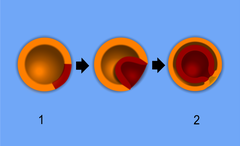Phôi thai học


Phôi thai học là một phân ngành của sinh học nghiên cứu về sự phát triển trước khi sinh ra của giao tử (tế bào giới tính), thụ tinh, và sự phát triển của phôi và bào thai. Thêm nữa, phôi thai học bao gồm cả việc nghiên cứu những rối loạn bẩm sinh xảy ra trước khi sinh, còn được biết đến là quái thai học.[1]
Phôi thai học có một lịch sử lâu dài. Aristotle đề xuất thuyết biểu sinh mà hiện nay được chấp nhận, rằng sinh vật phát triển từ hạt hoặc trứng trong một chuỗi các bước. Tuy nhiên học thuyết đối lập, thuyết tiên thành, theo đó sinh vật phát triển từ một phiên bản tý hon đã tồn tại trước của chính nó, lại giữ vị thế thống trị mãi cho đến thế kỷ XVIII. Phôi thai học hiện đại phát triển từ các công trình của von Baer, mặc dù các quan sát chính xác đã được thực hiện tại Ý bởi các nhà giải phẫu học như Aldrovandi và Leonardo da Vinci vào thời Phục Hưng.
Phát triển phôi ở động vật
[sửa | sửa mã nguồn]Sau giai đoạn phân cắt, các tế bào đã phân cắt, hay còn gọi là phôi dâu, trở thành một quả bóng rỗng, hay phôi nang, thứ phát triển tạo ra một cái lỗ ở một đầu.
Ở người
[sửa | sửa mã nguồn]Con người là động vật đối xứng hai bên và động vật miệng thứ sinh.
Ở người, thuật ngữ phôi ám chỉ quả bóng tế bào đã phân chí từ thời điểm hợp tử tự cấy chính nó vào thành tử cung vào cuối tuần tám sau thụ thai. Sau tuần tám sau khi thụ thai (tuần mười của thai kỳ), đứa trẻ đang phát triển vào lúc đó được gọi là bào thai.
Tham khảo
[sửa | sửa mã nguồn]Chú thích
[sửa | sửa mã nguồn]Nguồn
[sửa | sửa mã nguồn]- Embryology - History of embryology as a science." Science Encyclopedia. Web. 06 Nov. 2009.<http://science.jrank.org/pages/2452/Embryology.html>.
- "Germ layer." Encyclopædia Britannica. 2009. Encyclopædia Britannica Online. 06 Nov. 2009 <http://www.britannica.com/EBchecked/topic/230597/germ-layer>.
Đọc thêm
[sửa | sửa mã nguồn]- Apostoli, Pietro; Catalani, Simona (2011). “Chapter 11. Metal Ions Affecting Reproduction and Development”. Trong Astrid Sigel, Helmut Sigel and Roland K. O. Sigel (biên tập). Metal Ions in Toxicology. Metal Ions in Life Sciences. 8. RSC Publishing. tr. 263–303. doi:10.1039/9781849732116-00263.
- Scott F. Gilbert. Developmental Biology. Sinauer, 2003. ISBN 0-87893-258-5.
- Lewis Wolpert. Principles of Development. Oxford University Press, 2006. ISBN 0-19-927536-X.
- Carlson, Bruce M.; Kantaputra, Piranit N. (2014). Human embryology and developmental biology. Philadelphia, PA: Elsevier/Saunders. ISBN 978-1-4557-2794-0. (click here for more information)
Liên kết ngoài
[sửa | sửa mã nguồn]| Wikimedia Commons có thêm hình ảnh và phương tiện truyền tải về Phôi thai học. |
- Online course in embryology Lưu trữ 2021-02-24 tại Wayback Machine
- Indiana University's Human Embryology Animations Lưu trữ 2019-10-16 tại Wayback Machine
- UNSW Embryology Large resource of information and media.
- What is a human admixed embryo?
- Definition of embryo according to Webster Lưu trữ 2010-01-30 tại Wayback Machine
Text is available under the CC BY-SA 4.0 license; additional terms may apply.
Images, videos and audio are available under their respective licenses.
